 Your new post is loading...

|
Scooped by
EcoVadis
March 3, 2017 6:00 AM
|
On Sunday, Greenpeace interrupted a Samsung press conference to protest the company’s failure to produce a recycling plan for the defective Galaxy Note 7, recalled last year due to fire risk. The campaign group claims Samsung has 4.3m handsets to get rid of.
A Samsung spokesperson has since said the company is working “to ensure a responsible disposal plan” for its defunct phones, and prioritising safety and environment. But if the piled up Galaxy Note 7s go the same way as the rest of our old smartphones, computers and tablets, where might they end up?

|
Scooped by
EcoVadis
March 1, 2017 6:08 AM
|
The new law obliges French companies to adhere to a vigilance plan to prevent violations of human rights and environmental damage throughout their production chains. Companies can be sanctioned with fines of up to €30 million for not respecting the rules.

|
Scooped by
EcoVadis
February 28, 2017 11:33 AM
|
Only about 1% of the companies were able to declare that their products were conflict-free beyond a reasonable doubt. Of the rest, 19% declared that they had no reason to believe their products contained DRC conflict minerals. The remaining 80% admitted that they were unable to determine their raw materials’ country of origin.

|
Scooped by
EcoVadis
February 27, 2017 11:05 AM
|
Samsung Group chief Jay Y. Lee was arrested on Friday over his alleged role in a corruption scandal rocking the highest levels of power in South Korea, dealing a fresh blow to the technology giant and standard-bearer for Asia's fourth-largest economy.

|
Scooped by
EcoVadis
February 13, 2017 8:21 AM
|
Telstra has a unique opportunity to lead the way in stewarding retired electronics, and providing solutions to e-waste.

|
Scooped by
EcoVadis
January 26, 2017 5:40 AM
|
Disruptive technologies and digital infrastructure have the potential to solve some of the world’s most pressing risks and to transform industries. These include safeguarding the planet's soil and water, and improving inequality and education.
This is the main conclusion of the 2017 Global Opportunity Report, released by DNV GL, Sustainia and the United Nations Global Compact. The report also demonstrates the commitment of the global business community towards taking action on the UN Sustainable Development Goals (SDGs) and the 2030 agenda.

|
Scooped by
EcoVadis
January 25, 2017 4:50 AM
|
In this latest twist of the scandal that's been rocking South Korea for weeks, prosecutors are investigating allegations that Samsung might have provided €2.8m euros ($3.1m, £2.5m) to a company co-owned by Ms Choi and her daughter, to bankroll the daughter's equestrian training in Germany.

|
Scooped by
EcoVadis
December 29, 2016 4:55 AM
|
Chinese telecommunication sector is fully integrated into the global supply chain. Among the multinational companies supplied by Chinese telecoms are Alcatel-Lucent and Ericsson, who both produce and sell in the U.S. market. As a result, it is practically impossible to turn away from “Made in China” products. Rather than officially boycott Chinese telecom products or engage in protectionism, the United States could mitigate security threats by adopting an inspection system similar to the United Kingdom’s.

|
Scooped by
EcoVadis
December 28, 2016 4:31 AM
|
The attention from State comes as industry groups have recently launched two initiatives aimed at curbing child labor and other dangerous practices in their cobalt supply chains. Cobalt is essential for the lithium-ion batteries used in smartphones, laptops and electric vehicles. Sixty percent of the world’s supply of cobalt comes from Congo, which has a long history of loose regulation of mines.

|
Scooped by
EcoVadis
December 21, 2016 2:35 AM
|
Conditions in the mines are rarely safe, and Amnesty International reports that most miners work without essential protective gear, such as gloves, work clothes, or face masks to protect their skin and lungs from disease. The organization says at least 80 miners died in the DRC between September 2014 and December 2015, and many more become ill from working in the poor conditions.
To make matters worse, many of the miners Amnesty International interviewed were children who said they worked for 12 hours a day to earn a mere dollar or two. UNICEF says that approximately 40,000 children worked in mines in the DRC in 2014, and that the majority of them were mining cobalt.

|
Scooped by
EcoVadis
December 20, 2016 12:21 PM
|
information and communications technology, or ICT, can potentially save 1.5 GT of CO2e in the year 2030. That’s fully 2.7 times greater than the full carbon emissions of the UK in 2012, and 37% of the EU’s 2012 emissions. Of course, we know that all those server farms and cell towers use a lot of energy themselves, but according to the report, the ICT emissions overhead is only about 5.3%.

|
Scooped by
EcoVadis
December 20, 2016 11:08 AM
|
The Post traced this cobalt pipeline and, for the first time, showed how cobalt mined in these harsh conditions ends up in popular consumer products. It moves from small-scale Congolese mines to a single Chinese company — Congo DongFang International Mining, part of one of the world’s biggest cobalt producers, Zhejiang Huayou Cobalt — that for years has supplied some of the world’s largest battery makers. They, in turn, have produced the batteries found inside products such as Apple’s iPhones — a finding that calls into question corporate assertions that they are capable of monitoring their supply chains for human rights abuses or child labor.

|
Scooped by
EcoVadis
December 20, 2016 8:42 AM
|
The Samsung labor scandal has hit Malaysia factory where the workers have to work under poor conditions and paid as little as £268 a month [A$449]. A total of 2,000 workers spend up to 12 hours a day in the plant where Samsung microwaves are manufactured. Is the company cheating factory workers?
|

|
Scooped by
EcoVadis
March 2, 2017 12:55 PM
|
"Ericsson recognizes that conducting business responsibly is fundamental to our company values and we focus on continuously strengthening our programs and processes each year. In 2016, we made our first statement on Modern Slavery and Human Trafficking for the Ericsson Group. The Company has a zero-tolerance approach to corruption, and significantly strengthened its anti-corruption program during 2016."

|
Scooped by
EcoVadis
February 28, 2017 12:42 PM
|
Companies say the conflict minerals law has created an expectation both inside their corporate headquarters and among consumers that their products will be “conflict-free.”
They do not want to back away from that now. But they worry their efforts will be undermined without the law to support them.

|
Scooped by
EcoVadis
February 28, 2017 10:29 AM
|
The Joint Audit Cooperation held its sixth corporate and social responsibility forum bringing together 133 representatives from large ICT companies, i.e. telecom operators and equipment manufacturers, organizations active in Corporate Social Responsibility issues (CSR), academia, auditing companies, International NGOs to further develop sustainable business practices.

|
Scooped by
EcoVadis
February 14, 2017 5:20 AM
|
HP was one of only 29 global companies out of more than 3,300 assessed by CDP to earn a position on the inaugural supplier engagement leader board, which highlights the leading practices of companies working directly with their suppliers to reduce emissions and lower climate-related risks in the supply chain in the past reporting year.

|
Scooped by
EcoVadis
February 6, 2017 1:41 AM
|
A recent study issued by the United Nations University’s Sustainable Cycles programme (UNU) indicates that the amount of e-waste in Asia has risen by 63 percent in the last five years. In China, the generation of e-waste more than doubled between 2010 and 2015, with Hebei, Hunan, Guangdong and Jiangxi Provinces being the most prominent.

|
Scooped by
EcoVadis
January 25, 2017 7:10 AM
|
The men said they had been deceived about pay, had their passports confiscated and had been told that they must pay large fines if they wanted to return to Nepal before the end of their contract. They also claimed they were forced to work for up to 14 hours on their feet without adequate rest, and with restricted toilet breaks, in an attempt to settle recruitment fees of up to £1,000 – they said they had to pay this money to secure their jobs

|
Scooped by
EcoVadis
January 16, 2017 5:37 AM
|
A total of 19 companies have signed a declaration of support for the EEIC's Responsible Raw Materials Initiative (RRMI), which is run in partnership with the Conflict-Free Sourcing Initiative (CFSI).
As well as electronics giants, including Apple, Accer, Cisco, Dell, Google, Microsoft, Sony and Samsung - it has also attracted support from the automotive industry and has been signed by Ford Motor Company.

|
Scooped by
EcoVadis
December 29, 2016 2:03 AM
|
Apple, HP, Samsung SDI and Sony have joined an effort known as the Responsible Cobalt Initiative. It is being led by a Chinese business group, the Chinese Chamber of Commerce for Metals, Minerals and Chemicals Importers and Exporters, and supported by the Organization for Economic Cooperation and Development (OECD), according to the Chinese group. Members of the initiative pledged to follow OECD guidelines for mining supply chains, which call for companies to trace how cobalt is being extracted, transported, manufactured and sold. Any abuses would require immediate correction.

|
Scooped by
EcoVadis
December 21, 2016 4:41 AM
|
Nearly 50,000 workers from some of Vietnam's poorest towns and villages work up to 12 hours a day in the vast Samsung complex built amid farmland with one of Southeast Asia's cheapest labour markets.
And while Samsung insists it will not axe jobs in Vietnam this year because of the scandal, workers in the battery factory within the complex say the company has already started temporary lay-offs.

|
Scooped by
EcoVadis
December 20, 2016 1:24 PM
|
Urging governments, businesses and civil society leaders to develop new technologies that have a lasting social impact in his message for the Day, the UN chief highlighted that the 17 Sustainable Development Goals specifically call for employing information and communication technology (ICT) to realize the overall vision of a life of dignity for all people.
“These technologies provide smart solutions to address climate change, hunger, poverty and other global challenges,” the Secretary-General said. “They are key instruments for providing mobile health care and access to education, empowering women, improving efficiencies in industrial and agricultural production, and safeguarding the environment.”

|
Scooped by
EcoVadis
December 20, 2016 11:10 AM
|
The impact of ICT on carbon emissions including their manufacture, transport and disposal, is expected to grow from 2% of total emissions today to at least the 3% in 2020. The biggest contributor to the increase of ICT emissions is the proliferation of data centres. However, with proper focus and investments, ICT technologies will be able to eliminate more emissions than they will possibly create.

|
Scooped by
EcoVadis
December 20, 2016 10:01 AM
|
Tracing the origins of the graphite in a phone, for example, requires finding out where the phonemaker obtains batteries, where the battery makers acquire the portion of batteries known as anodes, and where the anode producers get their graphite. Moreover, because there are multiple suppliers at each step and various types of graphite, it is difficult to know where any given batch of the mineral ends up.
Several companies declined to disclose the origin of their graphite. For example, Tesla, perhaps the best-known electric-car maker, uses Panasonic batteries. Tesla said those batteries have never included graphite from the Chinese company BTR, but it declined to identify its graphite source.
|





 Your new post is loading...
Your new post is loading...


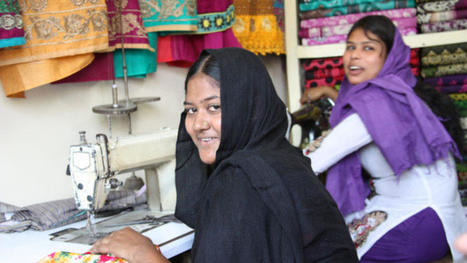


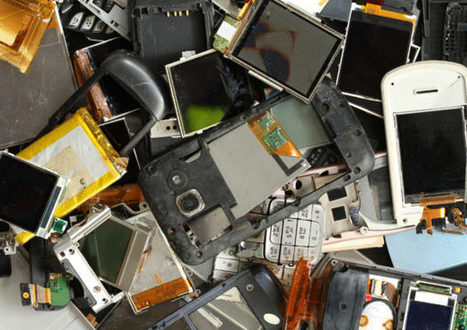
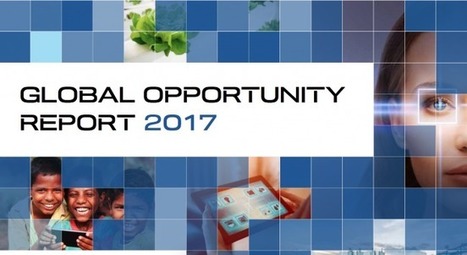



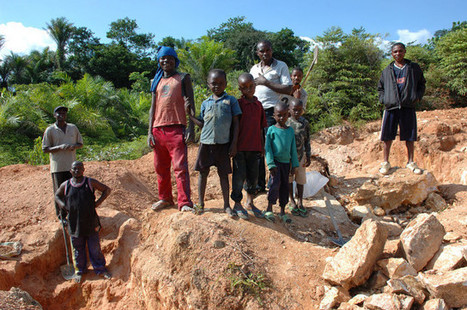
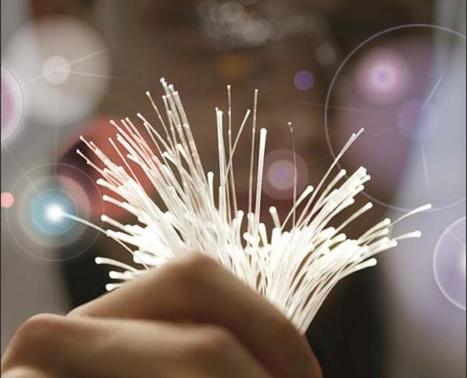
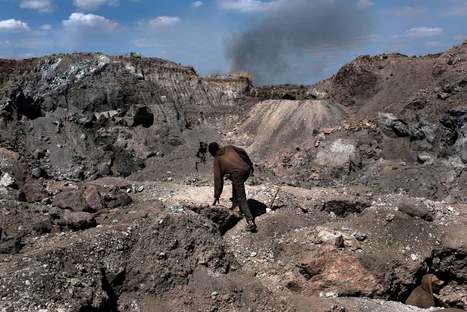


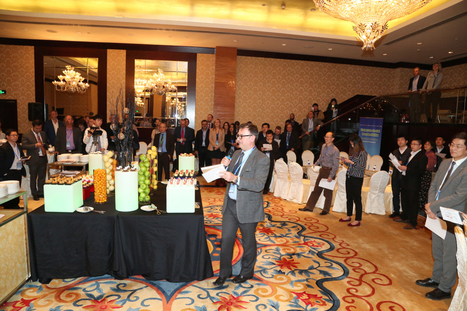
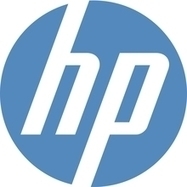


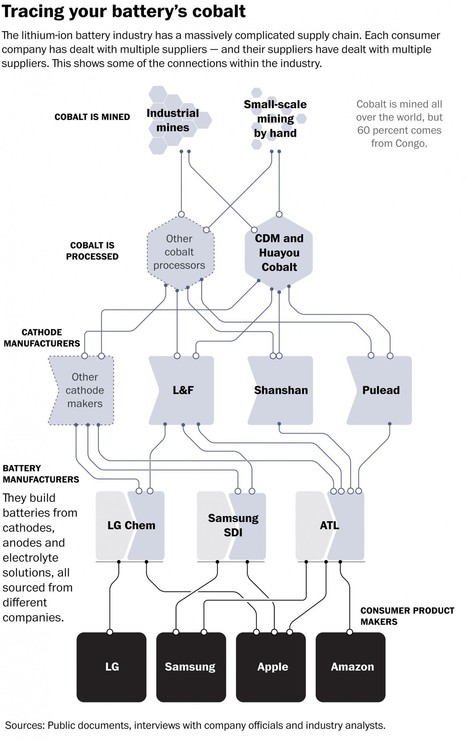


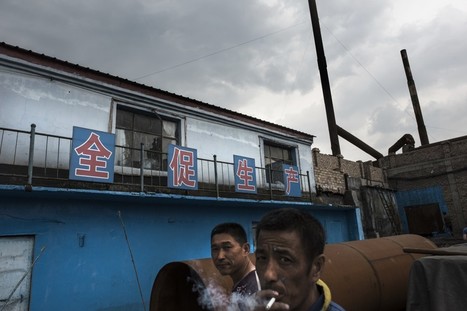





Insightful article on how e-waste can be responsibly disposed.